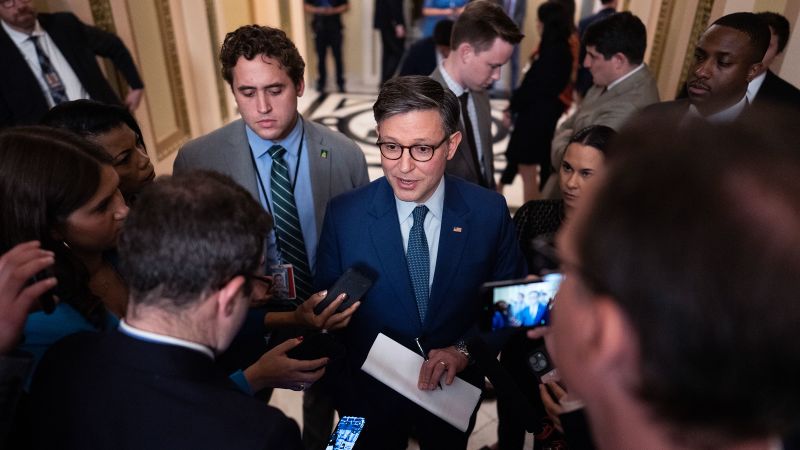In a decisive week for President Donald Trump’s legislative agenda, House Republicans have begun delving into what is being referred to as “one big, beautiful bill.” Speaker Mike Johnson faces a considerable challenge as he works to unify the different factions within the Republican Party in order to prevent any dissent that could derail this extensive GOP initiative. With the stakes high, the GOP leadership is optimistic about advancing Trump’s ambitious tax and spending reforms, aiming for a vote on the House floor by Memorial Day. This timeline, however, has raised eyebrows even among members of the party who considered it overly ambitious.
On Tuesday, following their return to Washington, House lawmakers resumed discussions, with key committees engaging in what could be lengthy debates lasting 24 hours or more regarding the proposed legislation. These marathon sessions are designed to inch forward on the various components of the legislation. Despite the significant number of hurdles yet to be addressed, the Republican leadership is confident as they navigate the intricacies of a bill that could have a substantial impact on tax and spending prerogatives.
However, fractures within the party surface as Speaker Johnson grapples with pushback from both moderate and hardline factions, along with unresolved policy disagreements. Given the slim majority the Republicans hold in the House, achieving near-complete unity is critical for the success of this bill. Some Republicans suggest that the influence of Trump himself may be needed to secure the necessary support.
During committee hearings on Tuesday, Democrats expressed strong opposition to the GOP’s tax cut plans, claiming they would disproportionately benefit billionaires and threaten vulnerable populations. A significant point of contention lies in a proposed overhaul of Medicaid, which Democrats argue could result in disenfranchising children and disabled individuals by imposing stricter work requirements. Republicans counter that their proposals target only able-bodied adults, affirming their commitment to preserve access for individuals with disabilities.
The atmosphere during discussions particularly centered around Medicaid became charged, leading to the arrest of 26 protesters by Capitol Police for their disruptive behavior. At one point, even the typically composed Energy and Commerce panel descended into chaos, sparking arguments over the use of the term “lying,” as GOP Chairman Brett Guthrie was compelled to step in to restore order.
Meanwhile, amid these contentious discussions, Speaker Johnson has dedicated efforts to unify his party. He has reached out to conservative hardliner Rep. Chip Roy of Texas, who has expressed concerns about the proposed changes to Medicaid. Additionally, Johnson met with the SALT Caucus, a group of Republican members from states with high taxes advocating for the repeal of the 2017 deduction cap on state and local taxes.
Following a meeting with these key stakeholders, Johnson expressed optimism about reaching a resolution soon, forecasting that data from Congress’ nonpartisan tax analysts would be instrumental in finalizing the proposal. The GOP tax writers aim to increase the cap on state and local taxes from $10,000 to $30,000 per year, albeit with limitations on eligibility; many members consider this new cap inadequate, particularly those representing high-tax states like New York and California.
Among the dissenters is Rep. Nick LaLota, who has been vocal about needing a significantly higher cap and has expressed disappointment with current proposals. Aligning with him, GOP Rep. Mike Lawler reiterated that he could not support the sweeping bill unless more favorable terms regarding the SALT cap were negotiated. Lawler remains firm, indicating that he looks forward to continuing discussions with party leadership in hopes of securing real tax relief for his constituents.
As the legislative discussions unfold, controversy intensifies with hardline members like Rep. Elise Stefanik opposing the proposed cap and complicating negotiations further. Overall, the GOP’s expansive legislation aims to fulfill many of Trump’s campaign promises, including the elimination of certain federal taxes. Notably, it also includes a referendum on increasing the debt limit with an anticipated cost of $4 trillion.
The comprehensive package emphasizes notable extensions from Trump’s tax reforms and introduces innovative ideas such as a “MAGA” savings account for children, encouraging tax-free savings for youth under the age of 18. Before ultimately progressing, however, the consolidated bill is set to face additional scrutiny from the fiscally conservative House Budget Committee.
As of now, uncertainty looms regarding the overall costs associated with the bill, placing pressure on Speaker Johnson and his leadership to provide clarity. Johnson has assured members that estimated savings align with previously established budget targets but has yet to confirm specifics, pending additional information from the Congressional Budget Office. The dynamics within the party and the intense discussions surrounding this landmark legislation are poised to be defining moments as Republicans seek to navigate their ambitious agenda.
In closing, continuous developments from Capitol Hill contribute to a narrative filled with both potential and challenge, ultimately shaping the trajectory of Trump’s legislative goals as Republicans strive to convert promises into reality.



